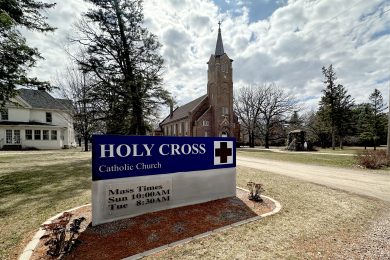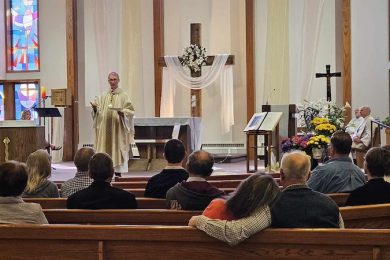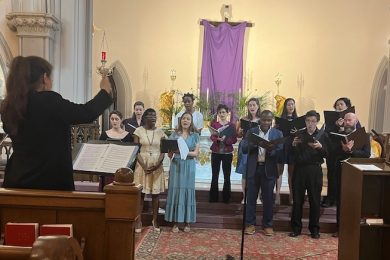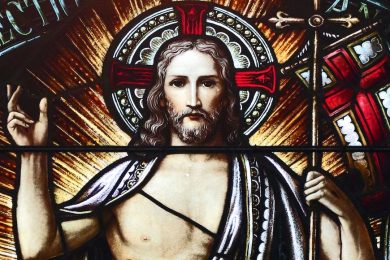RYE, N.Y. (CNS) — Across the country, Catholic dioceses, parishes and other church-run entities say the federal emergency “bridge loans” they applied for and received have helped keep much-needed ministries functioning during this coronavirus pandemic and the economic downturn that has resulted.
By some estimates, thousands of individual churches, schools, food pantries and other social service programs would have shuttered all around the country were it not for these Paycheck Protection Program loans, established by the CARES Act.
“Very specifically, the Payroll Protection Program loans enabled us to keep essential workers employed providing essential services,” said Msgr. Kevin Sullivan, who is executive director of Catholic Charities for the Archdiocese of New York, a federation of 90 agencies.
Msgr. Sullivan estimated 15 to 20 of the agencies applied for these loans and were given a total of $15 million to $20 million. The Catholic Charities network delivers $800 million in services each year, he said.
“The program let us provide services and keep our workers working in the midst of diminished resources,” Msgr. Sullivan told Catholic News Service. Services provided through contracts with government agencies were in jeopardy because it was not clear if contractual obligations would be canceled as government resources decreased, he said.

Msgr. Sullivan described a recent visit to a Catholic Charities agency that helps people with severe and persistent mental illnesses. “The PPP was a really important source of cash. They did not have to lay off any of the staff who care for this vulnerable population,” he said.
“Our workers are not rich and many would be in a precarious position if they did not have a paycheck. They could lose their apartments,” he said.
Msgr. Sullivan said a young worker whose job was retained with the Payroll Protection Program funds became the family breadwinner when both of her parents lost their jobs during the shutdown.
Employees of some school-based operations, such as tutoring, truancy prevention and college preparation were retained when the programs were suspended or virtual platforms.
As an example, “Alianza Youth Services made 2,000 calls each week to stay in touch with families in its program in Washington Heights,” he said. The neighborhood in northern Manhattan includes many immigrants from the Dominican Republic.
“With the loans, you get two-for-one,” Msgr. Sullivan said. “You don’t interrupt essential services that are needed even more during the pandemic and you keep people employed and earning a decent wage.”
From the Catholic perspective, it is better to keep people working and protect their dignity than to have them unemployed, Msgr. Sullivan said.
The loans also cushioned the blow from lost donations, he said. “April, May and June are big fundraising months for all nonprofits. When the events we canceled, we lost millions of dollars in revenue we were counting on.”
Although virtual fundraising galas will help, Msgr. Sullivan said in-person events are consistently more successful. He said it is possible that golf outings will be conducted in the fall, but the scheduling of other anticipated events is being “played by ear.”
Msgr. Sullivan said Catholic Charities agencies would consider applying for additional funds if the government approves a new round of loans. “If the government has a program that supports the common good, we are happy to participate if it helps the people our mission is to serve.”
Msgr. Donald Dwyer, is pastor of Church of the Resurrection in Rye, a suburb north of New York. The large parish employees 75 people in its church, school and religious education programs.
By Msgr. Dwyer’s count, the Payroll Protection Program saved him from firing or furloughing 20 employees. “These are longtime parish workers with families,” he said. “I had been worrying since March about this horrible pandemic, worrying about my parishioners, my schoolchildren and my employees. The PPP eased my worries,” he said.
“We used every penny we received on maintaining employees and on increased maintenance, daily cleaning and sanitizing,” said Msgr. Dwyer, who was one of two priests at Resurrection — and more than 200 people in Rye — who became ill with COVID-19.
“I am grateful that the bureaucrats in Washington got their act together to help us,” he said.
Msgr. Dwyer said church attendance is at 30% of pre-pandemic levels, Sunday collections are down by 25% and he is dipping into reserves for both the church and the parish elementary school.
“I don’t know how long we have before the reserves are depleted,” he said. With the jump in unemployment, the pastor said he is “swamped” with requests for scholarships and tuition subsidies and concerned that enrollment will drop before the school year begins.
“I hope we can go back to school in person in September. Otherwise, it will have a profound effect on our school,” he said.





















